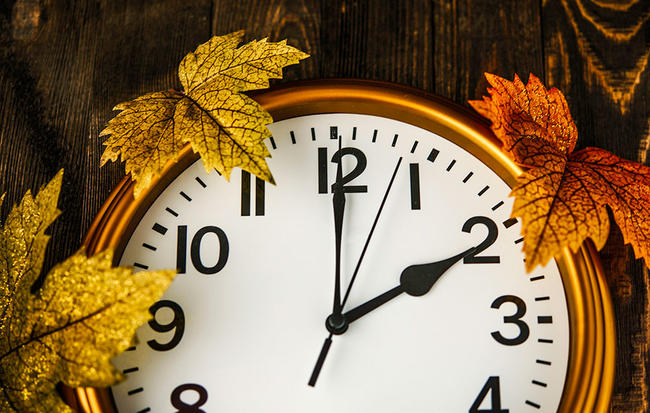On the morning of November 5th, many of us will wake up feeling a little more chipper than usual. Turning the clock back to Standard Time brings that delicious extra hour of sleep we look forward to all year. In our sleep-deprived society, most of us cherish that hour of shut-eye like a gift from heaven.
But for some people, the shift to Standard Time can actually bring on sleep problems. That’s because the transition from Daylight Savings Time can disrupt the body’s sleep-wake cycle, like a mini version of jet lag. With sunrise now at about 6:37 a.m. and sunset at 4:51 p.m. (in the Northeast), some of us find ourselves waking up too early and pooping out right after dinner. Although the autumn time change is easier for most people than the spring transition, it can take a little while to make the autumn adjustment. A few simple strategies can help you make the transition more easily.
If you have insomnia or are prone to sleep problems, any change in your schedule—even a one-hour change in your sleep cycle—can trigger restlessness. And even good sleepers may need a few days to adjust to the time change. Here’s why: If your normal bedtime is 11:00 p.m., that’s when your body is programmed for sleep. Once the clocks are set back to Standard Time, your body will be ready for sleep at 10:00 p.m. One major influence on your body’s sleep-wake cycle is sunlight. So even though the clock has changed by one hour, your body is still responding to when the sun rises and sets. Until your body clock adjusts, it may be more difficult to fall asleep at the desired clock time, and than can make it more difficult to get up in the morning.
That extra weekend hour is great, but it could have a ripple effect through the rest of the year. Here are some tips for getting your sleep onto a regular schedule, so your sleep rhythms will sync up with the clock time as soon as possible:

1. Resist the temptation to go to bed too early
With the sun now setting at 4:45, you may feel like hitting the sack right after dinner. If you find that going to bed earlier causes you to get up in the middle of the night, or wake up earlier than you want, then you need to stay up later.

2. Use room-darkening shades to keep your bedroom dark for sleeping
The shift to Standard Time pushes sunrise to an hour earlier. This can affect your sleep by waking you earlier, especially if you are used to waking up before or around sunrise. Eye shades (like this one from Jersey Slumber) are another effective way to block light from reaching your eyes.

3. Increase the light when you wake up, and in the afternoon
Light has an alerting affect that can help set your new wake-up time. It will help adjust your biological clock to the new sleep schedule. If you find yourself getting tired too early in the evening, get outside into the sunshine in the afternoon (and use these other tricks to get more sunlight during the day). Afternoon sun will help reset your biological clock to help you stay up until your desired bedtime.

4. If you find yourself getting tired during the day…
… and you don’t ordinarily take naps, don’t start now. When you take naps, you start shifting your body’s sleep rhythm by sending the message that daytime is sleep time (that is, if you don’t do it correctly. Taking the proper power nap could actually benefit your productivity). When it’s time to go to bed, you want to be able to sleep. But if you satisfy your sleep need too early in the day, you won’t be sleepy at your desired bedtime. (If you sleep well at night, and typically take daytime catnaps, that’s probably not a problem.)

5. Have patience, and give your body a chance to adjust
It takes a few days for your body’s temperature rhythms to adapt to the new clock time. Temperature rhythms influence alertness; your body temperature is at its highest during waking hours, which typically is daytime for most people. At night when you’re asleep, body temperature falls and reaches its lowest point. That’s why, if you stay awake through the night, when your body temperature is at its lowest, you feel terrible—then you feel a “second wind” in the early morning, as your body temperature has begun to rise.
If you’re generally a good sleeper, but you notice that you suddenly have a sleep-related problem once Daylight Savings Time ends, it’s probably nothing to worry about. It will most likely resolve on its own, and a few days of the strategies described above can help you get back to normal sooner.













